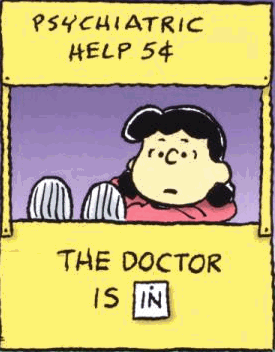 The American Psychiatric Association (APA) is in the process of revising its bible of mental disorders, the Diagnostic and Statistical Manual of Mental Disorders (DSM). Research planning for the new version, called DSM-5, began in 1999. The release date has now been extended until 2013.
The American Psychiatric Association (APA) is in the process of revising its bible of mental disorders, the Diagnostic and Statistical Manual of Mental Disorders (DSM). Research planning for the new version, called DSM-5, began in 1999. The release date has now been extended until 2013.
The revision process has been contentious. Daniel Carlat, on his psychiatry blog, described the exchange between opposing psychiatrists as a bar room brawl that had “degenerated into a dispute that puts the Hatfield-McCoy feud to shame.”
The latest history of and update on the warring factions comes from an article in Wired magazine by Gary Greenberg, author of Manufacturing Depression: The Secret History of a Modern Disease. He interviews Allen Frances, lead editor of the manual’s previous version (DSM-IV). Frances came out of retirement to voice his objections to the upcoming revisions.
Medicating children: A bonanza for big pharma
Frances accuses his psychiatry colleagues “not just of bad science but of bad faith, hubris, and blindness, of making diseases out of everyday suffering and, as a result, padding the bottom lines of drug companies.” Particularly objectionable to Frances was an emphasis on early intervention in childhood disorders by labeling – and medicating — children considered “at risk” for a disorder. As he wrote in an article for Psychiatric Times, the creation of “at risk” patients would cause a “wholesale imperial medicalization of normality” and “a bonanza for the pharmaceutical industry.”
Speaking of DSM-IV, the previous version edited by Frances, Greenberg writes: (emphasis added)
“We made mistakes that had terrible consequences,” he [Frances] says. Diagnoses of autism, attention-deficit hyperactivity disorder, and bipolar disorder skyrocketed, and Frances thinks his manual inadvertently facilitated these epidemics—and, in the bargain, fostered an increasing tendency to chalk up life’s difficulties to mental illness and then treat them with psychiatric drugs. …
If, as Frances warns, the new volume is an “absolute disaster,” it could cause a seismic shift in the way mental health care is practiced in this country. It could cause the APA to lose its franchise on our psychic suffering, the naming rights to our pain.
Greenberg concludes:
What the battle over DSM-5 should make clear to all of us—professional and layman alike—is that psychiatric diagnosis will probably always be laden with uncertainty, that the labels doctors give us for our suffering will forever be at least as much the product of negotiations around a conference table as investigations at a lab bench. Regier [the APA’s director of research] and Scully [medical director of the APA] are more than willing to acknowledge this. As Scully puts it, “The DSM will always be provisional; that’s the best we can do.” Regier, for his part, says, “The DSM is not biblical. It’s not on stone tablets.” The real problem is that insurers, juries, and (yes) patients aren’t ready to accept this fact. Nor are psychiatrists ready to lose the authority they derive from seeming to possess scientific certainty about the diseases they treat. After all, the DSM didn’t save the profession, and become a best seller in the bargain, by claiming to be only provisional.
Such candor is refreshing.
Related posts:
Should grief be labeled and treated as depression?
Should psychiatrists go to med school?
Should the medical establishment regulate psychotherapy?
Resources:
Image: The Human Future
Gary Greenberg, Inside the Battle to Define Mental Illness, Wired, December 27, 2010
Gary Greenberg, Manufacturing Depression: The Secret History of a Modern Disease
Allen Frances, A Warning Sign on the Road to DSM-V: Beware of Its Unintended Consequences, Psychiatric Times, June 26, 2009
Allen Frances, Good Grief, The New York Times, August 14, 2010
Daniel Carlat, Psychiatry’s DSM-V Process: Now A Bar Room Brawl, The Carlat Psychiatry Blog, June 30, 2009
Benedict Carey, Revising Book on Disorders of the Mind, The New York Times, February 10, 2010


I think the problem began when the world depression relaced meloncholia. I’m not a doctor and I can tell the difference between a respnse to suffering and a suffering response to a realty that doesn’t exist.
Psychiatry shoud just be regulated to medical issues. Leave the personality traits to the psychologist. Psychiatrists should begin practicing as medical physicians. Outside of reading blood work they practice no actual medicine. They work out of a book (DSM) and prescribe meds as per pharma company direction or diagnose as to what the insurance companies pay. No needs a medical degree to do that!
Thank you for your thoughts, Carmen. There are many who would agree with you about how depression, as a medical condition, replaced sadness and melancholy as a human condition. For example Allan Horwitz and Jerome Wakefield in their book “The Loss of Sadness: How Psychiatry Transformed Normal Sorrow into Depressive Disorder.” They argue that psychiatry no longer makes a clear distinction between normal sadness and a diagnosed depressive disorder. It’s an interesting subject that throws light on our culture and the times we live in.
I think psychiatrists may be getting a bum rap these days. The media loves to tell us about those who are shilling for the pharmaceutical industry, but when psychiatrists save lives as part of their daily practice, it’s not news and so we’re not aware of it.
I wrote a blog post called Should psychiatrists go to med school? (http://bit.ly/hZAv3Q). It was a guest post on KevinMD, where it generated an interesting discussion about the profession (http://bit.ly/i8DauK).